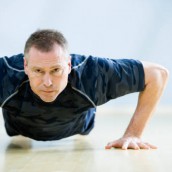 When I ask my male patients how much protein do they eat every day, many of them look at me kind of bewildered. Some don’t really know which foods are protein and have no idea how much they’re eating every day. Yet, as a man gets older, it’s important to get enough protein for two reasons…
When I ask my male patients how much protein do they eat every day, many of them look at me kind of bewildered. Some don’t really know which foods are protein and have no idea how much they’re eating every day. Yet, as a man gets older, it’s important to get enough protein for two reasons…
Build Muscles, Save Your Bones
As people get older, they start to lose muscle mass. Research shows that by age 65, about 25% of people have lost enough muscle/bone mass to decrease their overall strength. The reason for these losses can be related to a few things but mostly two basics:
- Lack of muscle/bone building exercise like brisk walking, weight training, jogging.
- Deficient nutritional building blocks like protein.
Good muscle mass and strength directly relates to the density of bones as well. Strong muscles have more mass and create more friction when they rub against bone during exercise. They help bones stay strong in two ways:
- Muscle/bone friction stimulates bone cells to grow and become more dense. Thicker, stronger bones decreases risk for fracture in older adults.
- Strong muscles also help with balance and posture that decreases the risk of falls.
In order to preserve the strength of your bones as you get older and decrease your risk for fracture, it’s important to keep your muscles strong. Increasing protein intake can help.
Researchers out of McMasters University in Toronto recently studied the effect of protein on muscles after exercise. They found that current guidelines for eating meat are based on the amount needed to prevent deficiency. What they wanted to learn was the optimal amount of protein needed for preservation of muscle mass – particularly in older adults who need to maintain good muscle mass.
In their study of men aged about 59, they found that eating 6 ounces of meat after exercise resulted in more muscle protein synthesis, or MPS. MPS is essential to the ongoing repair, growth, maintenance of skeletal muscle in men with or without lifting weights. Their study showed, however, that the amount currently recommended as adequate protein intake – 3 ounces – is half of what is minimally needed to reach optimal MPS.
How Much Protein Should You Eat?
The McMasters University study found that minimal 6 ounces of meat was necessary to create adequate MPS. That translates to about 42 grams of protein. Yet, that amount is not enough to support good health overall. Generally, protein intake for an adult should be based on your weight. Some sources say 0.5 gram of protein per pound of body weight, others say 1 gram protein. I think somewhere in the middle of these recommendations is optimal. For example, if you weighed 160 lbs, 80 grams of protein will keep you from being deficient, but about 120 grams will help you build muscle mass.
Keep in mind that not all your protein, or any, has to come from animal meat, for those who do not wish to eat red meat. Beef, though contains other nutrients, like B12, that may be missing from more vegetarian-based diets. Many older people develop B12 deficiencies.
Other non-red meat sources of protein are:
- Eggs – about 7 grams of protein each.
- Chicken and turkey have about 10 grams per ounce.
- Fish – salmon, tuna, mackerel, etc, contain about 10 grams per ounce.
- Dairy – cheese has about 10 grams of protein per 1 ounce, milk about 8 grams per 8 ounces.
- Nuts – about 7 grams protein per 1 ounce.
- Protein supplements – protein powder supplements can be made from whey (a cheese product), soy, casein (a milk protein), brown rice, or pea. A few scoops a day in a shake can boost your protein intake. Amount of protein content differs per product.
- Some grains – quinoa, amaranth have higher amounts of protein, about 7 grams per 4 ounces.
If you want to maintain a stricter vegan diet, combining several vegetable proteins (nuts, grains, vegetables), along with a brown rice or pea based protein supplement, can help you maintain optimal protein intake. Keeping a good acid/ash balance in your diet by eating more vegetables and fruits, limiting coffee to 3 cups a day, limiting alcohol, will help decrease bone loss as well.
There’s no real reason why getting older has to mean getting weaker muscles and bones. Following a good routine of regular muscle strengthening/bone building exercise, like those listed above is the first step. Adding enough protein to your diet will also help re-build, maintain muscle tissue. Good muscles and strong bones will keep you as active as ever, and fracture-free, as you get older.
Stay Well,
Mark Bromson, M.D.
Natural Health News
Middle-Aged Men May Need More Protein To Maintain Muscle Mass, http://www.medicalnewstoday.com/releases/255887.php
Prevent Bone Loss and Muscle Weakness, http://www.ppg.com/corporate/wellness/coh/10keys/Pages/Key08.aspx
photo credit: fitnesscoat.com
